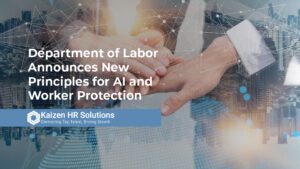2023 is just around the corner – so what workplace trends should we be prepared for? Indeed and Glassdoor have just released their annual Hiring and Workplace Trends Report, featuring smart insights on the future of work. This year’s report focuses on how a handful of recent shifts are likely to continue evolving, transforming how we think about work and what the employer-employee relationship looks like.
Let’s take a look at the five top takeaways from the Indeed/Glassdoor report – plus, what they mean for you.
- Tight Labor Supply Will Continue to Impact Hiring
The immediate challenges of the peak pandemic years may be behind us, but don’t expect hiring to rebound to pre-2020 norms. Although those particular pressures may shrink, other, long-term labor supply issues will make hiring a continued challenge in the near future. One key factor driving this shrinking labor pool is the shrinking number of work-age adults across many developed countries, including the U.S., the U.K., Canada, several EU countries, China, and Japan.
HR teams will be leading the way to develop effective strategies for hiring and retention throughout this labor supply crisis. When it comes to highly technical and specific roles, the labor pool may be even smaller, which requires its own unique approach. Expect HR teams to lean into creative problem-solving to find sustainable ways of attracting and retaining top talent in competitive industries.
- Remote Work Is Here to Stay
Remote work has become a staple of the working world over the last few years, and to the surprise of many, it’s been incredibly effective – and it’s not going anywhere. Both job postings and job searches mentioning remote work are still up significantly from pre-pandemic levels, as more people prioritize some form of remote, hybrid, or flexible work. While surveys have found that only around one-third of jobs are truly well-suited for remote work, many companies are leaning into it to fill in-demand roles in fields like software development, marketing, finance, and more.
HR teams have already been leading the remote work shift over the last few years, developing strategies for managing remote teams, ensuring productivity, supporting employees, and translating culture in a remote world. 2023 is likely to see much of the same, although the focus will continue shifting towards long-term policies, especially since strong remote/hybrid policies are a major determining factor for so many job seekers today.
- As Workers Seek Higher Pay, Benefits Set Employers Apart
It’s simple: better pay is still top of the list for today’s job seekers. Among employed U.S. workers between the ages of 25 and 54, “higher pay” was the top reason for seeking a new job. Combine that with ongoing wage gains and inflation, and workers are expecting higher pay at a minimum. To stand out, companies are re-evaluating their overall employee value proposition, including benefits – both traditional ones like PTO, retirement, and health insurance, and “newer” ones like commuter benefits, flexible scheduling, and mental health support.
As employees shift their priorities, HR is best positioned to report on these priorities and to advocate for employees. HR may not be able to set budgets on their own, but they’re the ones that manage the effects of it when it trickles down to compensation, benefits, and overall culture. Look for HR teams to continue their advocacy and work with other company leaders to assemble the most attractive benefits packages possible in order to attract and retain top talent.
- Happiness and Wellbeing Matter
It’s been a tough few years for everyone. Those stresses, combined with new priorities and new labor market information, has led to more employees prioritizing a positive culture, more support, and a greater sense of satisfaction and purpose in their work. Stress can lead to decreased satisfaction and more turnover, while positive changes can have a major positive impact on retention. In fact, an increase of just one star in a company’s Glassdoor rating corresponds with a 6 percent drop in the likelihood of U.S. employees starting new job applications, and that number goes up to 15% in Germany, 19% in the U.K., and 25% in France!
HR is the “point team” for hearing about what employee are thinking, meaning that they’re probably the first to be able to piece together a picture of what is and isn’t working well. Armed with those insights, HR can help to put those concerns in front of the decision-makers who can address them from the top down. The focus should be on collaborating with other leaders to create a culture of genuine support, purpose, and positivity.
- The Changing Workforce Is Pushing Diversity, Equity, and Inclusion to the Forefront
DEI continues to grow in importance, both due to external pressures and to demographic shifts. Millennials and, especially, Gen Z, are more diverse than any previous generation, and they’re also more invested in DEI. 72% of workers between ages 18 and 34 would consider turning down or leaving a job if their manager did not support DEI initiatives, but that percentage decreases with each older age bracket. However, 62% of workers overall would say the same, and 74% consider corporate DEI investment as “somewhat” or “very” important when considering new job opportunities.
Whether DEI is its own section or a part of the overarching HR department, HR’s function is inextricably entwined with DEI. HR should be carefully monitoring current policies and adjusting as necessary. Especially as it becomes more and more important to job seekers, it’s even more critical to have a robust commitment to DEI and to build a workplace where everyone can feel that they can succeed and truly belong.
By Rose Dorta

Are you a high-performing leader or believe you have the potential to tackle a more challenging role? Would you be interested in career opportunities that are seeking these attributes?
I’d love to chat with you and answer any questions that you have. Email me, Rose Dorta, managing director of Kaizen HR Solutions, here.







